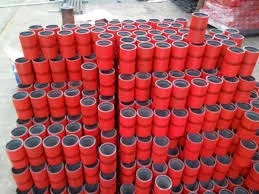teflon coupling
Understanding Teflon Coupling A Versatile Solution in Engineering
Teflon coupling, originating from the well-known brand name of polytetrafluoroethylene (PTFE), has become a staple in various engineering applications due to its unique properties. Teflon is revered for its exceptional chemical resistance, low friction coefficient, and ability to withstand extreme temperatures. These qualities make Teflon coupling a preferred choice in industries ranging from aerospace to food processing, where reliability and durability are paramount.
What is Teflon Coupling?
Teflon coupling essentially refers to the use of Teflon-based materials in coupling devices, allowing for the connection of two rotating shafts while minimizing wear and tear. These couplings are designed to transmit torque while accommodating misalignment, reducing vibrations and enhancing the overall efficiency of mechanical systems. The non-stick property of Teflon also ensures that contaminants do not cling to the surfaces, promoting cleaner operations.
Key Advantages of Teflon Coupling
1. Chemical Resistance Teflon is impervious to a wide range of chemicals, including acids, bases, and solvents. This characteristic makes Teflon coupling particularly valuable in chemical processing plants and laboratories, where equipment is often subjected to harsh substances.
2. Temperature Tolerance Couplings made from Teflon can generally operate effectively across a wide temperature range, from extremely low to high temperatures (typically from -200°C to +260°C). This ability to perform under varying thermal conditions ensures that machinery remains functional and reliable, even in extreme environments.
3. Low Friction The low friction coefficient of Teflon reduces the wear on coupling surfaces, extending the lifespan of the equipment. Additionally, this property leads to lower energy consumption in machinery, resulting in improved overall efficiency.
4. Flexibility and Misalignment Compensation Teflon couplings can accommodate a degree of misalignment between connected shafts. This ability to flex without losing functionality is crucial in applications where precision alignment is challenging to achieve, such as in motorized systems or conveyor belts.
teflon coupling

5. Ease of Maintenance Owing to their non-stick nature, Teflon couplings are easier to clean compared to their metal counterparts. This aspect is particularly beneficial in industries such as food and pharmaceuticals, where cleanliness is a stringent requirement.
Applications of Teflon Couplings
Teflon couplings find utilization in various sectors, reflecting their versatility
- Aerospace Engineering In aerospace applications, durability and weight are crucial. Teflon couplings are employed in aircraft engine components where exposure to extreme temperatures and corrosive substances is common.
- Chemical Processing Chemical plants use Teflon couplings in pumps and mixers, where they are subjected to aggressive chemicals. Their ability to prevent corrosion and maintain integrity under chemical exposure is essential for safe operations.
- Food Industry In food processing, Teflon couplings help assure compliance with hygiene standards. They are commonly found in conveyors and mixers, where a clean and smooth operation is necessary.
- Pharmaceuticals Similar to the food industry, the pharmaceutical sector demands high levels of cleanliness and resistance to aggressive cleaning agents. Teflon couplings play an integral role in machinery used in this field.
Conclusion
Teflon couplings represent a critical advancement in the realm of mechanical engineering, offering a combination of durability, flexibility, and resistance under harsh conditions. Their adoption across various industries underscores the importance of innovative materials in enhancing operational efficiency and equipment longevity. As technology continues to evolve, Teflon-based solutions are likely to see expanded applications, contributing to the development of more efficient and reliable industrial processes. With ongoing research into improving Teflon formulations and exploring new applications, the future of Teflon coupling looks promising, promising continued evolution and expansion within the engineering landscape.
-
Tubing Crossover - API Compatible, Custom Sizes, In StockNewsNov.10,2025
-
Tubing Coupling | High-Strength, Leak-Proof Steel CouplingsNewsNov.10,2025
-
Wholesale API Threading Casing Coupling | API 5CT, Fast ShipNewsNov.10,2025
-
Pup Joint Supplier | API Certified, Custom, Quick ShipNewsNov.10,2025
-
Pup Joint Manufacturers | Precision Machined, Fast DeliveryNewsNov.10,2025
-
Tubing Coupling | Precision Steel, Leak-Proof, Fast DeliveryNewsNov.03,2025







